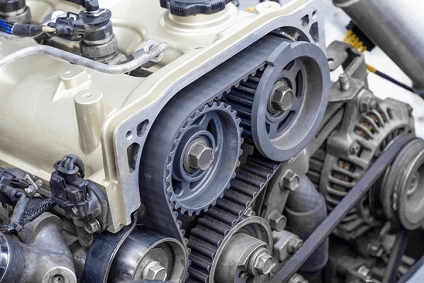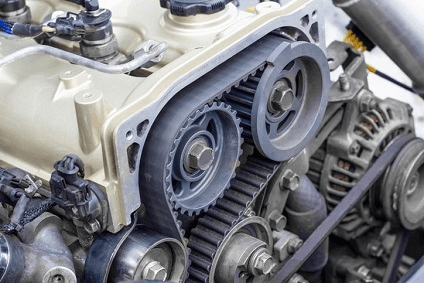
Timing Belt and Chain Replacement Services
Whether your vehicle needs a timing belt replacement or timing chain replacement, timely maintenance is crucial to keep your engine running smoothly. A worn or broken timing belt or chain can lead to significant engine damage, costly repairs, and dangerous driving conditions. At Meineke, we offer professional timing belt services and work with skilled timing chain mechanics to ensure your vehicle stays in top condition.

Why Timely Belt or Chain Replacement Matters
Your engine’s timing belt or timing chain keeps the crankshaft and camshaft in sync. When either of these components wears out or breaks, your engine’s valves and pistons can become misaligned—often resulting in serious damage. Replacing these parts at the recommended intervals prevents:
Catastrophic engine failure
Loss of power or engine performance
Costly repairs down the road
Unsafe driving conditions
Routine timing belt maintenance and inspections can help you avoid unexpected breakdowns and protect your engine's health.
Timing Belt Maintenance and Service Indicators
Many car manufacturers recommend replacing timing belts every 60,000 to 100,000 miles. Timing chains typically last longer, but they are not immune to wear. Even if you follow the recommended maintenance schedule, environmental conditions and driving habits may shorten the lifespan of these components.
To avoid sudden failure, pay attention to early warning signs and schedule regular maintenance with your local Meineke.
Warning Signs for Timing Belt Repair or Timing Chain Replacement
As your timing belt or chain wears down, it may cause a variety of engine performance issues. Below are specific symptoms to watch for based on the type of timing component your vehicle uses.
Timing Belt
A timing belt is a rubber belt with teeth that connects the crankshaft to the camshaft, keeping the engine’s valves opening and closing at the correct times. Since it’s made from rubber, it can wear down or deteriorate over time.
Common signs of a timing belt problem include:
Hard starts whether the engine is hot or cold
Large amounts of dark gray exhaust coming from the tailpipe
Poor idle that causes the car to shake
Frayed or split belt edges
Squeaking or chirping noises from the tensioner
Visible cracks in the belt (if accessible for inspection)
If you notice these signs, it may be time to replace the timing belt. Meineke offers fast and reliable timing belt replacement services to keep your car running safely.
Timing Chain
A timing chain performs the same function as a belt, but it's made of metal and located inside the engine. Although more durable, it can still stretch, wear, or break, especially in high-mileage vehicles.
Common signs of a timing chain problem:
Because you can't see the timing chain without taking apart the engine, it's important to report any of the following symptoms to a timing chain mechanic:
Engine misfires or running rough at idle
Rattling or scraping sounds from the front of the engine
Poor gas mileage
A “Check Engine” light related to timing performance
When these symptoms occur, timing chain replacement may be necessary.
How Meineke Technicians Can Help Replace a Timing Belt
Meineke technicians begin with a thorough diagnostic process to confirm the issue and rule out any related problems. Once it's determined that your timing belt or chain needs replacement, we take careful steps to:
Remove and replace the belt or chain
Re-time the engine accurately
Inspect related components like the tensioner and water pump
Test the engine after installation for proper performance
The process to replace a timing belt is typically faster than for a chain, but both require precision and experience. Visit a Meineke location today to ensure your engine gets the care it needs from professionals.
Find Meineke Near You
Timing Belt Repair FAQs
- A:
Replacing a timing belt typically takes 3–6 hours, depending on your vehicle’s make and model. Timing chains may take longer due to their location inside the engine. Your local Meineke can give you a time estimate specific to your car.
- A:
Ignoring a worn timing belt can lead to it snapping while driving, which can cause serious engine damage—especially in interference engines. This may result in bent valves, damaged pistons, and a costly engine rebuild. It's best to change timing belts as recommended by your manufacturer.
- A:
No. If you hear squeaking, chirping, or ticking sounds from your engine, it may indicate the timing belt is loose or worn. Driving with this issue can lead to total belt failure. Schedule an inspection with a technician as soon as possible.
- A:
Yes, though less frequently than belts. Over time, timing chains can stretch or wear, especially on high-mileage vehicles. If your car shows signs of chain problems, visit one of our timing chain repair shops near you.
- A:
Timing belts are rubber and usually need to be replaced every 60,000–100,000 miles. Timing chains are metal and typically last longer, but they can still require replacement or repair due to wear.
- A:
Costs vary depending on the make and model of your vehicle. Meineke provides transparent pricing and will give you an estimate before starting any timing belt repair or replacement services.
If you're experiencing symptoms or are due for a replacement, don’t wait, fix your timing belt before it becomes a bigger issue. Schedule service at Meineke for trusted timing belt replacement services near you.
